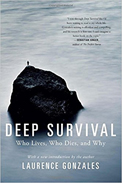
 |
Deep Survival: Who Lives, Who Dies, and Why
by Laurence Gonzales
W.W.Norton
Accidents cover a wide spectrum of often life-threatening scenarios. On the surface, survival appears random or at the very least circumstantial, but the survivors or top performers when challenged are those that use logic in harmony with inbred animal instincts or emotions, and they never follow the rules, not even their own, yet keep in touch with all of their knowledge and resources, their very position on the planet.
Author and journalist Gonzales offers a comprehensive examination of the path through living and dying in crisis. The answers aren’t singular or predictable. Just the stories alone, as retold by Gonzales with passion and a journalist's conciseness, are worth the read, and they are intermittently supported by science and research to complete the picture.
The book is divided into two parts—accident and aftermath—and it’s the latter, the stories of survival, that are even more compelling, as well as illustrative of the human experience and the way the mind operates. Unfazed by its promising title, this eloquently written and well researched investigation of survival through crisis entertains, informs, and incites. From the flawless landing of a military jet plane on a moving ship in the dead of night, to the miraculous drifting to safety through shark infested waters, one act of survival after another is described in minute detail.
The book makes an important contribution to the survival literature from both an academic and a practical standpoint, as it incorporates fact and humanity, science and soul. Not only valuable reading for individuals engaged in high risk activities, it's for all who will face emotional, physical, or financial distress at some point in our lives. And how do you know when that will come? You don't. One of the central messages is to be prepared b developing a core to fall back upon when it is most needed. The last thing you want to discover in crisis is that you don't have a core or much of one to guide you. Then you'll literally freeze up like a deer in the headlights, like a stuck machine, like most people.
And what type of life is it if you do not? As Eric Hoffer once said, "The remarkable thing is that it is the crowded life that is most easily remembered. A life full of turns, achievements, disappointments, surprises, and crises is a life full of landmarks." A crowded life also brings danger, even crisis, and those who survive are not always obvious.
This updated edition is the Eric Hoffer Book Award Gran Prize Winner and has been appreciated by a wide array of people and careers. It just might change the way you think.
RECOMMENDED by the US Review
Next Focus Review
Previous Focus Review